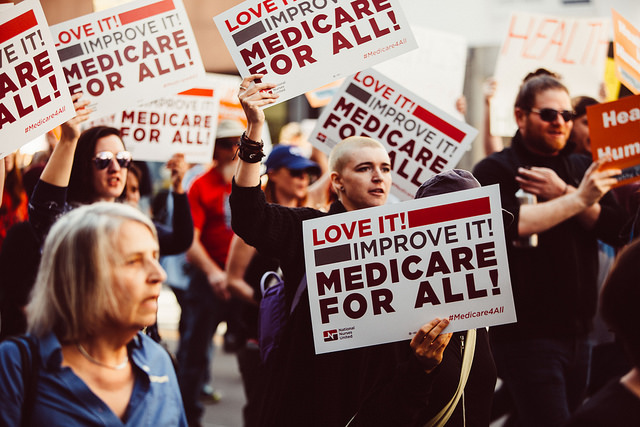My recent op-ed in the Washington Post explains why we cannot afford to live without Medicare for All. Expanding and improving on Medicare is the only realistic way for the US to rein in national health spending. With Medicare for All, the federal government would guarantee health insurance to everyone in the US and commercial health insurance would die out.
Conservatives oppose Medicare for All for a host of reasons, and especially because it would shift health care spending from the private sector–individuals and employers–to the federal government. But, according to Charles Blahous, a conservative who has pushed to privatize Social Security, it could also reduce overall health care spending by $2 trillion over ten years.
A Mercatus Center report, which Blahous authored, shows the unsustainability of our commercial health insurance system. Premiums, deductibles and copays are rising way faster than inflation. And, a large piece of people’s earnings are going toward their health insurance premium instead of into their paychecks. Blahous concedes that, with Medicare for All, people would see higher wages because employers would shift the money they currently spend on their workers’ premiums to their workers’ wages.
Blahous is concerned that Medicare for All would drive up health care utilization. It would not only cover everyone but also expand their benefits, doing away with deductibles and copays and covering dental, hearing and vision care. But, that’s the point. Instead of rationing care based on ability to pay, preventing people from getting needed care or impoverishing them, the US would treat health care as a basic need.
And, Medicare for All brings with it significant savings. It does away with all the administrative costs associated with commercial insurance, which some estimate to be as high as $500 billion a year. It also could cut prescription drug costs in half if we pay prices drugmakers charge the Germans and the Japanese, easily saving another $200 billion a year. Moreover, Medicare for All does away with irrational health care pricing and reins in provider rates, which also saves billions, $445 billion a year, according to Blahous’ conservative estimates.
The open question with Medicare for All is how the federal government will pay for health care costs currently paid for by the private sector. The answer is some mix of different taxes, the way every other government pays for health care for its citizens. All in, ordinary Americans will pay quite a bit less than the $28,000 a typical family of four now spends on health care.
My op-ed concludes: “There are always winners and losers in policy reform. Today, commercial insurers and other corporate interests in the health-care industry are the winners, and the American people are the losers. Medicare for All flips that paradigm. We can’t afford to live without it.”
Today, 63 percent of Americans support Medicare for All. If you support Medicare for All, please let Congress know. Sign this petition.
Here’s more from Just Care:










